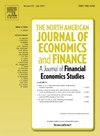美国的行业传染和以新闻为基础的经济政策不确定性是否会引起比特币投资者的恐惧或贪婪行为?
IF 3.9
3区 经济学
Q1 BUSINESS, FINANCE
North American Journal of Economics and Finance
Pub Date : 2025-04-06
DOI:10.1016/j.najef.2025.102429
引用次数: 0
摘要
我们通过使用2018年2月1日至2025年2月1日的每日时间序列数据,探讨了美国行业股、动态条件相关性(DCCs)和美国经济政策不确定性(U.S. EPU)之间的溢出冲击是否会增加比特币投资者的恐惧和贪婪情绪指数(BSI)。首先,我们通过使用时域和频域广义向量自回归方法探讨了美国11个主要行业股票回报之间的整体和频域短期和长期溢出冲击。为了进一步增强稳健性,我们还使用55对美国行业股票回报之间的DCC-GARCH-t copula方法提取了dcc,并使用一系列分位数回归模型对这些dcc和usepu的BSI进行了回归。为了优化投资组合,本研究还基于对冲比率检验了美国不同行业在高与低EPU制度下的对冲有效性(HE)。研究结果表明,总体和频域短期和长期美国行业股票回报的总连通性指数对BSI的不利影响是一致的。然而,美国行业之间冲击的长期溢出效应增加了比特币投资者的恐惧(更高的抛售行为),其程度超过了短期投资范围。此外,一系列分位数回归进一步强化了这种不利影响,美国所有55对行业之间的dcc增加了比特币投资者的极度恐惧。本研究为投资者在美国行业间冲击溢出机制较强时谨慎交易比特币提供了具体建议。本文章由计算机程序翻译,如有差异,请以英文原文为准。
Do US sectoral contagion and news-based economic policy uncertainty cause fear or greed behavior in Bitcoin investors?
We explore whether spillover of shocks between U.S. sectoral stocks, Dynamic Conditional Correlations (DCCs) and U.S. Economic Policy Uncertainty (U.S. EPU) increase Bitcoin investors’ fear and greed Sentiment Indices (BSI) by using the daily time series data from 1st February 2018 towards 1st February 2025. Initially, we explore the overall and frequency domain short- and long-term spillover of shocks between 11 major U.S. sectoral stock returns by using the time and frequency domain Generalized Vector Auto-regression approach. For further robustness, we also extract the DCCs using the DCC-GARCH-t copula approach between 55 pairs of U.S. sectoral stock returns and regress BSI on these DCCs and U.S.EPU with a series of quantile regression models. For portfolio optimization, this study also examines the hedging effectiveness (HE) of different US sectors under high vs low U.S. EPU regimes based on the hedge ratios. Findings present the consistent adverse effect of overall and frequency domain short- and long-term U.S. sectoral stock returns’ total connectedness indices on the BSI. However, the long-term spillover of shocks between U.S. sectors increases Bitcoin investors’ fear (higher selling behavior) with more magnitude than the short-term investment horizon. Furthermore, a series of quantile regressions further reinforce this adverse effect, and DCCs between all 55 pairs of U.S. sectors increase the extreme fear of Bitcoin investors. This study provides concrete recommendations for investors to exercise caution in Bitcoin trading when the shock spillover mechanism between U.S. sectors is stronger.
求助全文
通过发布文献求助,成功后即可免费获取论文全文。
去求助
来源期刊
CiteScore
7.30
自引率
8.30%
发文量
168
期刊介绍:
The focus of the North-American Journal of Economics and Finance is on the economics of integration of goods, services, financial markets, at both regional and global levels with the role of economic policy in that process playing an important role. Both theoretical and empirical papers are welcome. Empirical and policy-related papers that rely on data and the experiences of countries outside North America are also welcome. Papers should offer concrete lessons about the ongoing process of globalization, or policy implications about how governments, domestic or international institutions, can improve the coordination of their activities. Empirical analysis should be capable of replication. Authors of accepted papers will be encouraged to supply data and computer programs.

 求助内容:
求助内容: 应助结果提醒方式:
应助结果提醒方式:


